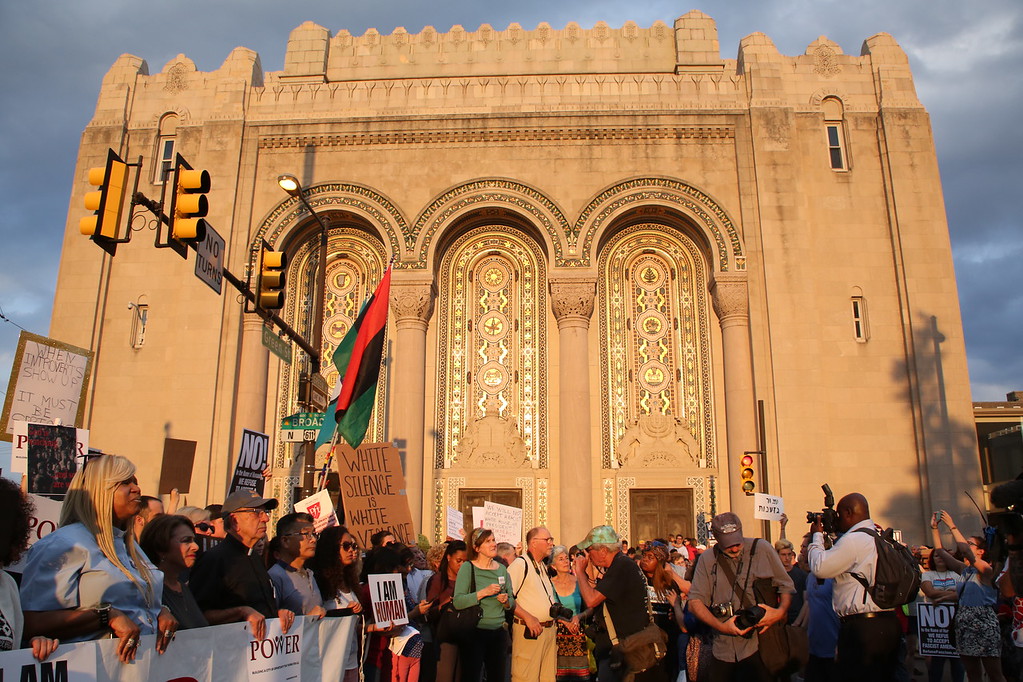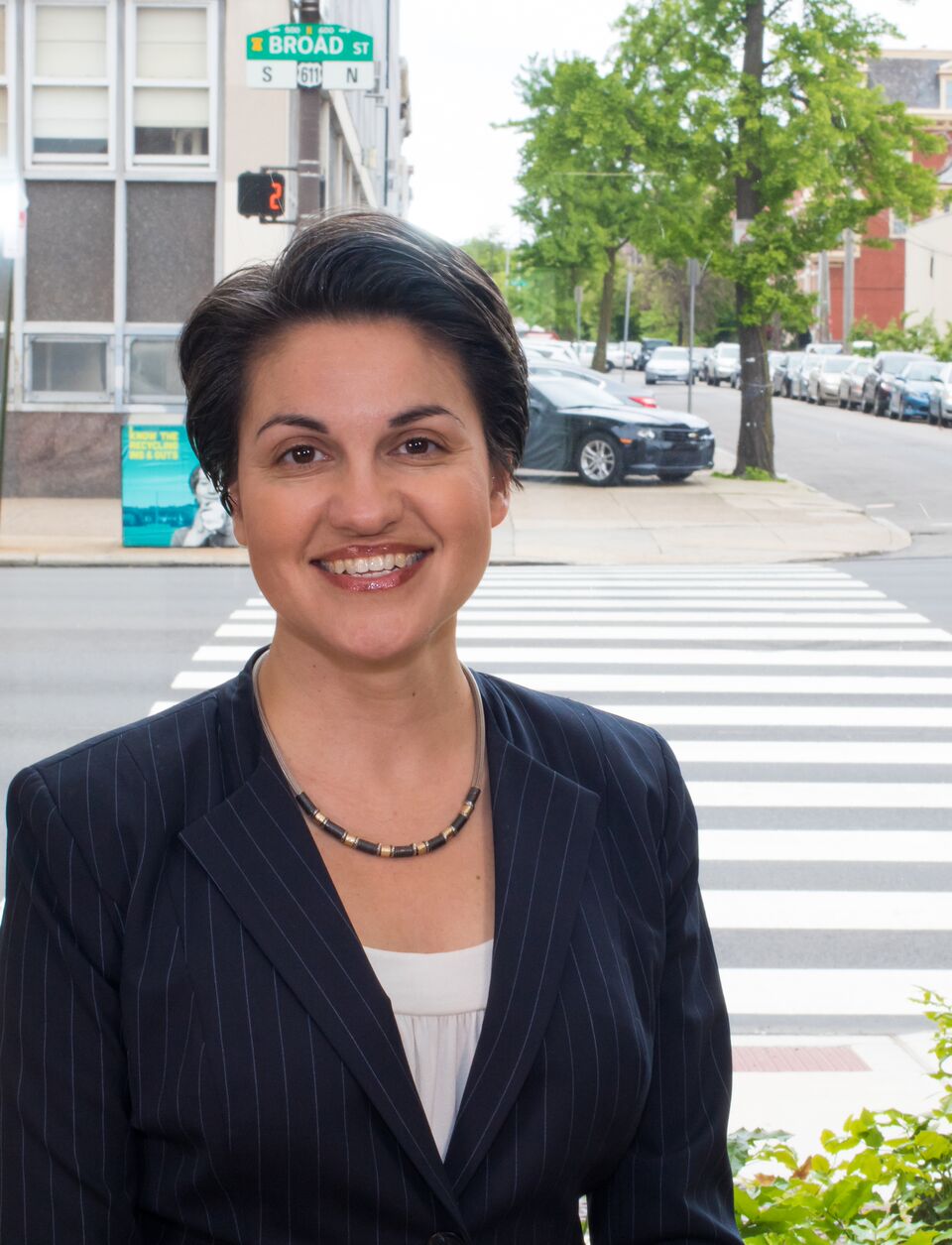 In all of my years preaching from our bimah, I think the sermon about which I have received the most response is the one that described my character revealing challenges in the Whole Foods parking lot. Speaking of which: What do you think of the new Whole Foods? I know that many of you shop there, because I see you there all the time. Even after a year of the new lay-out and new procedures, the new Whole Foods still unsettles me. When I’ve observed my discomfort I’ve thought of you. I’ve thought, every time congregants tell me that change in something as meaningful as synagogue life is difficult, I need to remember this — how disoriented I can feel about something so simple, as a new version of my grocery store. Change– change of all kinds– is hard. Continue reading
In all of my years preaching from our bimah, I think the sermon about which I have received the most response is the one that described my character revealing challenges in the Whole Foods parking lot. Speaking of which: What do you think of the new Whole Foods? I know that many of you shop there, because I see you there all the time. Even after a year of the new lay-out and new procedures, the new Whole Foods still unsettles me. When I’ve observed my discomfort I’ve thought of you. I’ve thought, every time congregants tell me that change in something as meaningful as synagogue life is difficult, I need to remember this — how disoriented I can feel about something so simple, as a new version of my grocery store. Change– change of all kinds– is hard. Continue reading
When do we walk the path together?: Discernment in Establishing Coalitions
 “See this day, I set before you, bracha uklalah — blessing and curse” (Deut 11:26). It’s one or the other. Elie Wiesel taught us: “We must take sides. Neutrality helps the oppressor, never the victim. We must take sides.”
“See this day, I set before you, bracha uklalah — blessing and curse” (Deut 11:26). It’s one or the other. Elie Wiesel taught us: “We must take sides. Neutrality helps the oppressor, never the victim. We must take sides.”
We can explore the issues, and learn from those who are different. But then, ultimately, we must take sides. The side of blessing or the side of curse. Commentators say the phrase from God, saying: “I set before you” indicates free will. It is our choice to make We need to determine, which is the path of blessing.
I’m filled with gratitude to have seen so many of you on Sunday at the “Vigil for Those Who Stood Against Hate in Charlottesville, and on Wednesday where Rabbi Freedman spoke so powerfully, at the “Philly is Charlottesville: Unmasking Racism” march. For when it comes to the anti-semitism and bigotry of white supremacy, the issue is not nuanced. We take sides. Hate does not require debate. For we have moral clarity, that we are all created in the image of God, and your presence this week has demonstrated moral leadership.
Even as our congregation takes the clear side against bigotry, we do face some tricky questions about how to be involved, and how not to be involved. I would like to step back, and to examine with you, some of the complexities I face when we collaborate with other groups, to respond to hate.Continue reading
Whoever is in Pain, Lead Him to the Physician*
The 7-year old boy’s heart begins to beat faster as he listens to the story of Abraham preparing to sacrifice his son, Isaac. The boy actually begins to sob with pity for Isaac. After the service, the rabbi approaches the boy. “Why were you crying? The rabbi asks, “You know the story; you know that Abraham does not kill Isaac.” The boy questions the rabbi, “Suppose the angel, had come a second too late?” The rabbi comforts the young boy saying, “angels, do not come late.”
That boy would become the great 20th century scholar, Rabbi Abraham Joshua Heschel, of blessed memory. Years later, Heschel would still be haunted by the same question: Suppose the angel had come, a second too late! As an adult, Heschel reflected that, while angels do not come late, human beings sometimes do. “All of history,” Heschel teaches, “has been a dry run for the moment when we can act like the angel; we must not be late.”Continue reading
Resolution of the Board of Trustees of Congregation Rodeph Shalom concerning Egalitarian Prayer at the Western Wall and Conversion in the State of Israel – June 27, 2017
Resolution of the Board of Trustees of Congregation Rodeph Shalom concerning Egalitarian Prayer at the Western Wall and Conversion in the State of Israel – June 27, 2017
Background:
This week in Israel, the Netanyahu government made two major decisions affecting most of the Diaspora, decisions which are especially hurtful because, as Rabbi Rick Jacobs, President of the Union for Reform Judaism put it, North American Jews have a “deep and unshakeable commitment to Israel.” Like we see our fellow Rodeph Shalom members as family, we see the Israeli people as family. We feel joy and pride with each Israeli accomplishment and we mourn each Israeli loss.Continue reading
Pull the Next Woman Up*: Eager to Welcome Naomi Chazan
Have you seen the new Wonder Woman movie?
I have been thinking about Wonder Woman this week, because of some recent news commentary. The Israeli Woman who sued El Al airlines for sexism won her landmark case. She had been told to change her seat because an Orthodox man wanted to ensure that he would not inadvertently be touched by a woman. The Israeli court found the gender-based seat-changing coercion practice, violates Israel’s anti-discrimination codes.
The woman, Renee Rabinowitz, was represented by the Israel Religious Action Center, the public advocacy and legal arm of the Reform Movement in Israel. The head of the Israel Religious Action Center, Anat Hoffman, described the 83-year old plaintiff Renee Rabinowitz as Wonder Woman. Funny, because Anat Hoffman might herself be called a Wonder Woman. From the courtroom to the Women of the Wall, Anat Hoffman has for years advocated for civil rights, women’s rights, state separation from Orthodox authority, and democracy in Israel.Continue reading
What is Old, Make New; What is New, Make Holy*
Reconsecrating Your Covenant with Each Other, My Covenant with You
 Delivered by Rabbi Maderer Friday night when we offered Renewal of Marriage Vows, and it was also Rabbi Maderer’s first Shabbat as senior rabbi.
Delivered by Rabbi Maderer Friday night when we offered Renewal of Marriage Vows, and it was also Rabbi Maderer’s first Shabbat as senior rabbi.
When Cantor Frankel chants the 7 Blessings/the Sheva Brachot in the vows renewal ceremony, we will hear a list of almost every word the Hebrew dictionary knows for joy. And what a joy it is to celebrate the bond of love and commitment! The conclusions of the final two of the blessings ask God to cause the couple to rejoice. Traditionally text says chatan and kallah, groom and bride; we are a community that thankfully includes LGBTQ couples and so we make a change to: reh-im and ahuvim, two words for beloved. If you listen closely, you will hear that in the 6th blessing, we ask God to cause one beloved and (in Hebrew v’) the other beloved, to rejoice together. In the 7th blessing, we ask God to cause one beloved with (in Hebrew im) the other beloved to rejoice together. By the time we reach the 7th blessing, the couple is not only one and the other, but one with the other, bound together in covenant.Continue reading
Vision for Our Next Era of Creating Profound Connections
What a profoundly moving season we have shared in our celebrations of Rabbi Kuhn, his legacy and his retirement! As powerful as our community events have been, the more behind-the-scenes transition process has been important as well. Rabbi Kuhn’s extraordinary generosity as my career-long mentor has guided the path of transition as he has been teaching me, empowering me, and handing over the reigns.
I already am blessed with deep relationships with our congregants and professional team; yet the time has come for us to be reintroduced to one another. Continue reading
Reform Zionism: Shaping a Zionism That Reflects Who We Are
Maybe you’ve heard this one:
The Chief Rabbi of Israel and the Pope are in a meeting in Rome. The Rabbi notices an unusually fancy phone in the Pope’s private chambers.”What is that phone for?” he asks the pontiff. “It’s my direct line to God!” The Holy Father insists that the Rabbi try it out, and, indeed, he is connected to God and has a conversation with her. After hanging up the Rabbi says. “Thank you! Please let me reimburse you for my phone charges.” The Pope, of course refuses, but the Rabbi is steadfast and finally, the pontiff gives in. “All right! The charges were 100,000 Lira.” The Chief Rabbi gladly hands over a packet of bills. A few months later, the Pope is in Israel and in the Chief Rabbi’s chambers he sees a phone identical to his, and learns it also is a direct line to God. The Pope remembers he has an urgent matter that requires divine consultation, and asks if he can use the Rabbi’s phone. The Rabbi gladly agrees, hands him the phone, and the Pope chats away. After hanging up, the Pope offers to pay for the phone charges. The Rabbi says: “1 Shekel!” The Pope looks surprised: “Why so cheap!?” The Rabbi smiles: “Local call.”Continue reading
Leia’s Bikini or Rey’s Shmata: Gender Bias in Society and in Us
 Princess Leia, actually Carrie Fisher, of blessed memory, recalls an outraged father challenging her, because she agreed to wear the skimpy iron bikini, in the scene with Jabba the Hutt, in The Return of the Jedi movie. Fisher’s response? A giant slug captured me, and forced me to wear that stupid outfit, and then I killed him, because I didn’t like it. And then I changed my clothes, back stage!
Princess Leia, actually Carrie Fisher, of blessed memory, recalls an outraged father challenging her, because she agreed to wear the skimpy iron bikini, in the scene with Jabba the Hutt, in The Return of the Jedi movie. Fisher’s response? A giant slug captured me, and forced me to wear that stupid outfit, and then I killed him, because I didn’t like it. And then I changed my clothes, back stage!
Decades later when the newest episode, The Force Awakens was produced, Fisher observed : the female protagonist Rey shows no cleavage, wears baggie pants, and is essentially wrapped in what we might call, a shmata. Progress. Continue reading

